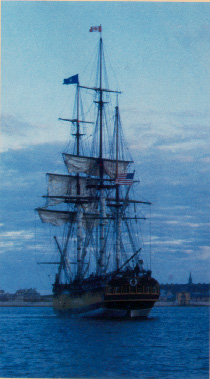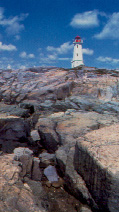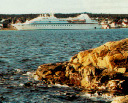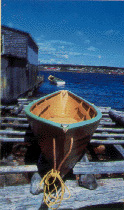|
|
|
|
Tourism
Website Design and Content
© by
Eric Krause, Krause House Info-Research Solutions
(© 1996)
All Images ©
Parks Canada Unless Otherwise Designated
Researching
the Fortress of Louisbourg National Historic Site of Canada
Recherche sur la Forteresse-de-Louisbourg Lieu historique national du Canada
The Town of Louisbourg
and Surrounding Area Tourism Site
|
|
|
|
The Louisbourg Harbour Brochure


Tall ship "H.M.S. Rose" from Bridgeport, Conneticut, passing the Fortress of Louisbourg.
"This is a beautiful island and a well-protected harbour. But the best thing about Louisbourg is the hospitality."
-- Captain Lane Briggs, Norfolk Rebel, Norfolk, Virginia
--------------------------------------------------
The Harbour | History | The Town | Louisbourg | Cape Breton Island
Louisbourg's harbour is the only naturally ice-free harbour north of Halifax. Wharves and docking are available for vessels of almost any size, from cruise ships to sail training ships to yachts.

Pilotage through the harbour is available, though not required, and a customs agent is on call. Ships chandlery, grocery stores (bonded), fuel, water, hot showers, post office, telephones, fax and laundry are not far from the wharves.
Ships sailing into Louisbourg harbour are greeted by the beam of Canada's oldest light station. Opposite the lighthouse in the southwest arm of the harbour is the august and imposing Fortress of Louisbourg, with its cannons pointed across the harbour. The town and docks lie in the most protected part of the harbour in the northeast arm.
Louisbourg has always depended on the sea. The earliest recorded European visit to the harbour was by the English in 1597. Recognizing the economic and military potential of Lousibourg's harbour and fishery, Louis XIV secured it for France in 1713 by constructing a well-fortified, walled city. Louisbourg, the Dunkirk of America, was the third busiest seaport on the continent during the 18th century.
Because of its strategic position, the fortress was successfully besieged by New England troops in 1745 and by British troops in 1758. But people who made their livelihoods from the sea continued to dwell in this rugged coastal area. Over the centuries local industries have included coal shipping, swordfishing, lobster, crab, and cod fishing and processing.
In the 1960s reconstruction began on the fortess ruins, and it became the largest reconstruction project in North America. Today it is the masterpiece in Parks Canada's portfolio.
The natural beauty of Cape Breton is the backdrop for this small fishing port. Not far from Louisbourg is Kennington Cove, a beautiful pristine beach. Hiking paths lead to the lighthouse and remote coastal vistas. The area is superb for biking, picniking, and swimming in summer and cross-country skiing in winter.
 Within walking distance of the docks are shops, museums,
pharmacy, medical clinic, motel, camp sites, and bed and breakfasts. Restaurants
specialize in lobster and other fresh local catches. Whale watching, wreck diving, harbour
tours, and deep sea fishing are easily arranged.
Within walking distance of the docks are shops, museums,
pharmacy, medical clinic, motel, camp sites, and bed and breakfasts. Restaurants
specialize in lobster and other fresh local catches. Whale watching, wreck diving, harbour
tours, and deep sea fishing are easily arranged.
Louisbourg is both an active fishing harbour and the site of an 18th century French fortress. The harbour is deep, large, and well protected. Located on the southeast coast of the island of Cape Breton, Louisbourg is surrounded by magnificent natural scenery -- rocky coasts, spruce and hardwood forests, abundant wildlife, and clean sandy beaches.

Those who visit the island of Cape Breton never forget it. The mingling of Gaelic culture with Canada's diverse ethnicities has created an island of old world charm and simple living. Bagpiping and fiddling fill the air when local musicians gather to celebrate their heritages on the shores and in the villages of this island.
Come visit Cape Breton and discover all of its natural and cultural beauties.

Other Links: